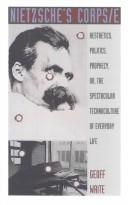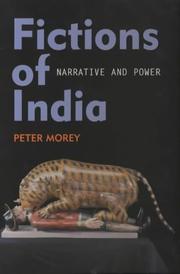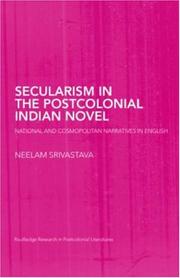| Listing 1 - 10 of 15 | << page >> |
Sort by
|
Book
ISBN: 0857283065 0857285645 Year: 2013 Publisher: London : Anthem Press,
Abstract | Keywords | Export | Availability | Bookmark
 Loading...
Loading...Choose an application
- Reference Manager
- EndNote
- RefWorks (Direct export to RefWorks)
'Postliberalization Indian Novels in English: Politics of Global Reception and Awards' is a critical handbook that focuses on trends in contemporary Indian novels and discusses the global reception of these works. The volume provides a systematic approach to the study of Indian novelists that have not been (with certain exceptions) extensively examined.
Book
ISBN: 9781107079960 9781139942355 9781107439306 1107079969 1107439302 1316309827 131628915X 1139942352 Year: 2015 Publisher: New York, NY Cambridge University Press
Abstract | Keywords | Export | Availability | Bookmark
 Loading...
Loading...Choose an application
- Reference Manager
- EndNote
- RefWorks (Direct export to RefWorks)
A History of the Indian Novel in English traces the development of the Indian novel from its beginnings in the late nineteenth century up until the present day. Beginning with an extensive introduction that charts important theoretical contributions to the field, this History includes extensive essays that shed light on the legacy of English in Indian writing. Organized thematically, these essays examine how English was 'made Indian' by writers who used the language to address specifically Indian concerns. Such concerns revolved around the question of what it means to be modern as well as how the novel could be used for anti-colonial activism. By the 1980s, the Indian novel in English was a global phenomenon, and India is now the third largest publisher of English-language books. Written by a host of leading scholars, this History invites readers to question conventional accounts of India's literary history.
Book
ISBN: 9048518857 9089645330 Year: 2013 Publisher: Amsterdam : Amsterdam University Press,
Abstract | Keywords | Export | Availability | Bookmark
 Loading...
Loading...Choose an application
- Reference Manager
- EndNote
- RefWorks (Direct export to RefWorks)
An assessment of twenty-first-century Indian-English fiction, 'Writing India Anew' features fifteen essays by some of the most prominent scholars in the field and explores a range of themes, including the remapping of mythology and history, the reassessment of globalized India, and technical experimentation in the epic, science fiction, and the graphic novel. Ultimately, the contributors to this volume contend that the current body of work in Indian-English fiction is so varied and vibrant that it can no longer be dismissed as derivative or dispossessed, or even as mere postcolonial 'writing back' or compensatory national allegory.
Indic fiction (English) --- Anglo-Indian fiction --- English fiction --- Indic literature (English) --- History and criticism.
Book
ISBN: 0333563638 9780333563632 Year: 1992 Publisher: Basingstoke, England Macmillan
Abstract | Keywords | Export | Availability | Bookmark
 Loading...
Loading...Choose an application
- Reference Manager
- EndNote
- RefWorks (Direct export to RefWorks)
English fiction --- Anglo-Indian fiction --- Indic fiction (English) --- History and criticism --- India --- In literature.
Book
ISBN: 9042028343 9789042028340 Year: 2009 Publisher: Amsterdam New York Rodopi
Abstract | Keywords | Export | Availability | Bookmark
 Loading...
Loading...Choose an application
- Reference Manager
- EndNote
- RefWorks (Direct export to RefWorks)
Raja Rao, one of the founding figures of Indian English literature, is re-examined in this comprehensive study of his fiction, which offers a fresh critical investigation into both his short stories and his novels. Powerfully contradicting the long-held perception of Raja Rao as a mere metaphysical writer and the true bard of quintessential Indianness, projected by many critics of the first Commonwealth generation over three decades, Stefano Mercanti posits Rao’s fiction in terms of its dialogic interaction – the ‘partnership’ – between Western and Eastern cultural traditions and demonstrates how it evolves during the course of his oeuvre on both the philosophical and the political level. The title, The Rose and the Lotus , signals the discursive terrain for a multicultural and interwoven evolution among different cultures, and points to the need for valuing relations of reciprocity rather than those of domination. Far from conveying univocal configurations and nationalistic stereotypes, Rao’s idea of India is seen as the epicentre of many echoes and dynamic resonances, both Western and Eastern, through which a distinct blend of Indian and European influences is more clearly unravelled. In this new critical re-appraisal, Mercanti draws on non-binary and inter/multi-disciplinary paradigms, thus signalling the complex transformations and multiple negotiations of a polyglot India caught between the cultural twilight of the modern and the traditional. The study also offers an invaluable linguistic analysis of Rao’s experiment with the English language, supplemented by a detailed glossary.
Indic fiction (English) --- History and criticism. --- Raja Rao --- Raja Rao. --- Criticism and interpretation. --- 1900-1999 --- India --- In literature.

ISBN: 0822317184 9780822317180 Year: 1996 Publisher: Durham Duke University Press
Abstract | Keywords | Export | Availability | Bookmark
 Loading...
Loading...Choose an application
- Reference Manager
- EndNote
- RefWorks (Direct export to RefWorks)
Anglo-Indian fiction --- Indic fiction (English) --- English literature --- History and criticism --- Indic influences --- Kipling, Rudyard, --- Knowledge --- India --- History --- Autonomy and independence movements. --- In literature.

ISBN: 058545082X 9780585450827 0748611819 9780748611812 Year: 2022 Publisher: Edinburgh
Abstract | Keywords | Export | Availability | Bookmark
 Loading...
Loading...Choose an application
- Reference Manager
- EndNote
- RefWorks (Direct export to RefWorks)
GBS_insertPreviewButtonPopup('ISBN:9780748611812);Fictions of India explores the relation of narrative technique to issues of power in the work of selected writers dealing with India. It examines the imperial context in which the writers operate and suggests how historical and ideological assumptions and anxieties may be read into the texts they produce. The study combines aspects of colonial and post-colonial debate with narrative theories to illuminate the work of these writers operating on either side of an epistemological divide formed by Indian independence in 1947.The book focuses largely on British writers on India with chapters on Kipling, E.M. Forster, John Masters, J.G. Farrell and Paul Scott. A final, comparative chapter traces the issues of narrative and power in the work of two post-independence Indian writers - Khushwant Singh and Rohinton Mistry - and deals with the burden of storytelling in a post-colonial situation still fraught with communal and neo-colonial abuses.This book is an important contribution to our understanding of how narrative fiction can reflect and confirm, but also contest and dismantle discourses of power.Key FeaturesOffers new interpretations of well-known texts and writersSuggests an agenda for studying new and less well-known texts to examine the play of narrative and power more generallyDemonstrates possible relations between narrative technique and those larger narratives which feed into the operation of political powerChallenges exclusivist readings which have often asserted 'the colonial' and 'the post-colonial' to be antithetical and mutually exclusive discursive entities"
English fiction --- Anglo-Indian fiction --- Indic fiction (English) --- Power (Social sciences) in literature --- Narration (Rhetoric) --- English --- English Literature --- Languages & Literatures --- Narrative (Rhetoric) --- Narrative writing --- Rhetoric --- Discourse analysis, Narrative --- Narratees (Rhetoric) --- History and criticism --- India --- In literature.
Book
ISBN: 081428082X 0814270018 081421133X 0814257305 Year: 2010 Publisher: Columbus : Ohio State University Press,
Abstract | Keywords | Export | Availability | Bookmark
 Loading...
Loading...Choose an application
- Reference Manager
- EndNote
- RefWorks (Direct export to RefWorks)
Cosmopolitanism in literature. --- Cosmopolitanism --- Postcolonialism in literature. --- Postcolonialism --- Indic fiction (English) --- History and criticism. --- Roy, Arundhati --- Rushdie, Salman --- Desai, Anita, --- Markandaya, Kamala, --- Sahgal, Nayantara, --- Criticism and interpretation. --- Post-colonialism --- Postcolonial theory --- Political science --- Decolonization --- Internationalism
Book
ISBN: 1283378744 9786613378743 1843318040 8190757008 Year: 2009 Publisher: London : Anthem Press,
Abstract | Keywords | Export | Availability | Bookmark
 Loading...
Loading...Choose an application
- Reference Manager
- EndNote
- RefWorks (Direct export to RefWorks)
Both rigorous and readable, Another Canon is an original contribution to the study of Indian English literature.
Indic fiction (English) --- History and criticism. --- India --- In literature. --- Canon (Literature) --- English literature. --- British literature --- Inklings (Group of writers) --- Nonsense Club (Group of writers) --- Order of the Fancy (Group of writers) --- Classics, Literary --- Literary canon --- Literary classics --- Best books --- Criticism --- Literature --- History and criticism

ISBN: 9780415402958 0415402956 9780203939345 9781134142163 9781134142200 9781134142217 9780415759502 Year: 2008 Publisher: London Routledge
Abstract | Keywords | Export | Availability | Bookmark
 Loading...
Loading...Choose an application
- Reference Manager
- EndNote
- RefWorks (Direct export to RefWorks)
This study explores the connections between a secular Indian nation and fiction in English by a number of postcolonial Indian writers of the 1980s and 90s. Examining writers such as Vikram Seth, Salman Rushdie, Amitav Ghosh, Shashi Tharoor, and Rohinton Mistry, with particularly close readings of Midnight's Children, A Suitable Boy, The Shadow Lines and The Satanic Verses, Neelam Srivastava investigates different aspects of postcolonial identity within the secular framework of the Anglophone novel. The book traces the breakdown of the Nehruvian secular consensus between 1975 and 2005 through these narratives of postcolonial India. In particular, it examines how these writers use the novel form to re-write colonial and nationalist versions of Indian history, and how they radically reinvent English as a secular language for narrating India. Ultimately, it delineates a common conceptual framework for secularism and cosmopolitanism, by arguing that Indian secularism can be seen as a located, indigenous form of a cosmopolitan identity.
Indic fiction (English) --- Secularism in literature. --- Cosmopolitanism in literature. --- Postcolonialism in literature. --- Identity (Psychology) in literature. --- History and criticism. --- India --- In literature. --- Cosmopolitanism in literature --- Identity (Psychology) in literature --- Postcolonialism in literature --- Secularism in literature --- History and criticism --- Roman indien (de l'Inde) de langue anglaise --- Sécularisme --- Cosmopolitisme --- Postcolonialisme --- 20e siècle --- Histoire et critique --- Dans la littérature --- Histoire de la littérature --- Sécularisme --- 20e siècle --- Dans la littérature --- Histoire de la littérature
| Listing 1 - 10 of 15 | << page >> |
Sort by
|

 Search
Search Feedback
Feedback About UniCat
About UniCat  Help
Help News
News